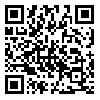Fri, Jan 2, 2026
[Archive]
Volume 19, Issue 3 (September 2023)
IJEEE 2023, 19(3): 115-129 |
Back to browse issues page
Download citation:
BibTeX | RIS | EndNote | Medlars | ProCite | Reference Manager | RefWorks
Send citation to:



BibTeX | RIS | EndNote | Medlars | ProCite | Reference Manager | RefWorks
Send citation to:
Ghanuni A, Sharifi R, Feshki Farahani H. An Information Gap Decision Theory Approach for Optimal Bidding of a Virtual Power Plant under System Uncertainties. IJEEE 2023; 19 (3) :115-129
URL: http://ijeee.iust.ac.ir/article-1-2779-en.html
URL: http://ijeee.iust.ac.ir/article-1-2779-en.html
Abstract: (2954 Views)
Operation scheduling of a Virtual Power Plant (VPP) includes several challenges for the system according to the uncertain parameters, and security requirements, which intensify the need for more efficient models for energy scheduling and power trading strategies. Making suitable decisions under uncertainties, related to Renewable Energy Resources (RES), loads, and market prices impose extra considerations for the problem to make a clearer insight for the system operators to participate in local markets. This paper proposes a new risk-based hybrid stochastic model to investigate the effects of wind turbine power fluctuations on profit function, energy scheduling, and market participating strategies. Also, an incentivized Demand Response Program (DRP) is used, to enhance the system’s efficiency. The results of the study indicate that the proposed model based on Information Gap Decision Theory (IGDT) approach makes a clearer environment for the decision-maker to be aware of the effects of risk-taking or a risk-averse strategy on financial profits. The results show that a 30% of robustness and opportunity consideration would change the profit function from -12.5% up to 14.5%, respectively. A modified IEEE 33 bus test system is used to simulate a technical VPP considering the voltage stability and thermal capacity of line requirements.
Type of Study: Research Paper |
Subject:
Day-Ahead and Intra-Day Scheduling
Received: 2023/01/14 | Revised: 2023/11/25 | Accepted: 2023/09/10
Received: 2023/01/14 | Revised: 2023/11/25 | Accepted: 2023/09/10
| Rights and permissions | |
 |
This work is licensed under a Creative Commons Attribution-NonCommercial 4.0 International License. |







